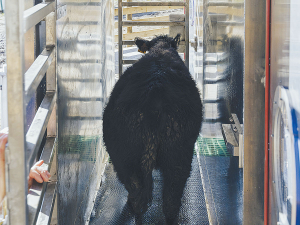NZ scientists make breakthrough in Facial Eczema research
A significant breakthrough in understanding facial eczema (FE) in livestock brings New Zealand closer to reducing the disease’s devastating impact on farmers, animals, and rural communities.
 Portable Accumulation Chambers (PAC) are designed to be transported to farms or central locations, where the cattle can be quickly and efficiently tested to see how much methane they emit.
Portable Accumulation Chambers (PAC) are designed to be transported to farms or central locations, where the cattle can be quickly and efficiently tested to see how much methane they emit.
AgResearch is claiming that new technology to measure bovine methane emissions will bolster efforts to reduce the climate change impact from livestock.
Portable Accumulation Chambers (PAC) developed by the Crown Research Institute are designed to be transported by road to farms or central locations, where the cattle can be quickly and efficiently tested to see how much methane they emit. AgResearch claims these measures will help farmers understand what the climate change impact is from their herd and individual animals and assist in breeding lower emitting animals.
Having used systems like this for sheep since 2015 to great effect, AgResearch senior scientist Dr Suzanne Rowe says this is the first time using PACs to measure emissions from cattle.
"The cow walks into the chamber and we capture all of the gas that's emitted from that animal for one hour. We then use this data to rank animals according to their emissions."
Methane is a short-lived (12 years vs. 300-1,000 years CO2) but potent (25-30 times more so than CO2) greenhouse gas emitted by ruminant animals such as cattle. StatsNZ end of year report for 2022 showed that methane emissions had dropped in 10 out of 16 regions between 2021-2022.
With methane reduction targets included in climate change legislation, breeding low methane emitting animals is one way of achieving reductions without cutting stock numbers or impacting production. Already proven in sheep, low-methane dairy cow genetics are expected to be in the market in the next few years.
The portable cattle chambers will provide further options on top of testing methods already in use, such as fixed "respiration chambers" located in a facility in Palmerston North and require the animals to be transported there and spend extended periods in the fixed chambers.
Welfare of the animals is carefully monitored and in the rare event they become stressed they are removed from the chambers.
The use of PAC's and development of low methane genetics is part of a wider nationwide effort with partners such as LIC, CRV, Pāmu, Beef + Lamb New Zealand and the Ministry for Primary Industries to support farmers to reduce their emissions.
Rowe says the chambers offer benefits not just for New Zealand, but other nations as well.
"We will use the portable chambers alongside the feed efficiency monitoring we already do, but there is also preliminary evidence in sheep that the measures taken in the cattle chambers may provide important insights on feed intake and efficiency as well as methane emissions."
She adds that NZ portable sheep chambers are now in use in other countries such as the UK and Norway, supporting their efforts to reduce farm emissions.
"We are looking forward to trialling the portable cattle chambers overseas, particularly in countries where they have extensive grazing systems and don't have the infrastructure such as fixed respiration chambers that we are fortunate to have in New Zealand."
Registrations are now open for the 2026 Ruralco Golf Classic, with all proceeds from the event set to support the Mid Canterbury Rural Support Trust.
Mating wrapped up last month at the across-breed Beef Progeny Test on Pāmu’s Kepler Farm in Manapouri.
Libby Judson is a keeper of memories from an age gone by. Tim Fulton tells her story.
A New Zealand-first native tree study has highlighted the Bioeconomy Science Institute's position as a forestry research leader.
Hemp fibre processor Rubisco is relocating its core processing facility to Ashburton as part of a $20-$30 million expansion to leverage what it says is an accelerating global demand for sustainable and renewable fibres.
Tradition meets some of the latest in technology at the 2026 East Coast Farming Expo.

OPINION: If the hand-wringing, cravat and bow-tie wearing commentariat of a left-leaning persuasion had any influence on global markets, we'd…
OPINION: With Winston Peters playing politics with the PM's Indian FTA, all eyes will be on Labour who have the…